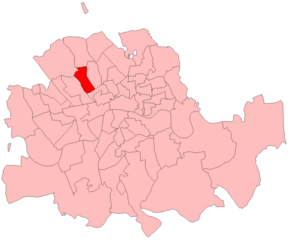St Pancras West (UK Parliament constituency) facts for kids
Quick facts for kids {{{Name}}}[[{{{Type}}} constituency]] |
|
|---|---|
| [[Image:{{{Map1}}}Constituency.svg|120px|]] [[Image:England{{{Map2}}}.svg|120px|]] |
|
| {{{Name}}} shown within [[{{{Entity}}}]], and {{{Entity}}} shown within England | |
| Created: | {{{Year}}} |
| MP: | {{{MP}}} |
| Party: | {{{Party}}} |
| Type: | House of Commons |
| County: | [[{{{County}}}]] |
| EP constituency: | [[{{{EP}}} (European Parliament constituency)|{{{EP}}}]] |
St Pancras West was a special area in London that elected one person to represent it in the House of Commons. The House of Commons is where laws are made for the United Kingdom. The person elected was called a Member of Parliament (MP).
This area, or "constituency," was created in 1885 for a general election and stopped being a separate constituency in 1918. People in St Pancras West voted using a system called "first past the post." This means the candidate who got the most votes won the election.
Contents
Where Was St Pancras West?
Every constituency has its own borders, which show exactly which streets and neighborhoods are included. The map shows where St Pancras West was located in London during the years it existed.
People Who Represented St Pancras West
The table below lists the Members of Parliament (MPs) who were elected to represent St Pancras West in the House of Commons. These individuals spoke for the people of St Pancras West and helped make decisions for the country.
| Year | Member | Party | |
|---|---|---|---|
| 1885 | Harry Levy-Lawson | Liberal | |
| 1892 | Harry Graham | Conservative | |
| 1906 | Sir William Collins | Liberal | |
| 1910 | Felix Cassel | Conservative | |
| 1916 | Richard Barnett | Unionist | |
| 1918 | constituency abolished | ||
Elections in St Pancras West
People in St Pancras West voted in several general elections to choose their MP. A general election is when people across the whole country vote for their representatives.
- In the 1880s, the Liberal Party won the first two elections.
- In the 1890s, the Conservative Party started winning the elections.
- In the 1900s, the Liberal Party won again in 1906.
- In the 1910s, the elections were very close. The Conservative Party won in December 1910.
Sometimes, an MP might leave their job before the next general election. When this happens, a special election called a "by-election" is held. In 1916, a by-election took place in St Pancras West. Richard Barnett won this election without anyone else running against him.
Images for kids
 | Jewel Prestage |
 | Ella Baker |
 | Fannie Lou Hamer |



